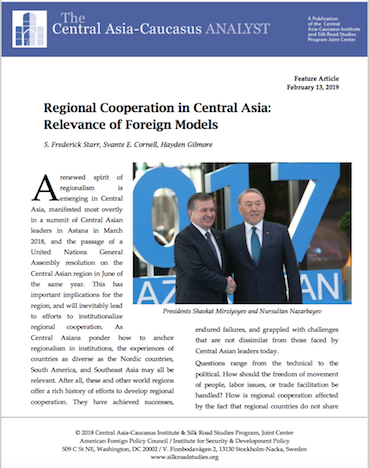Regional Cooperation in Central Asia: Relevance of Foreign Models
Regional Cooperation in Central Asia: Relevance of Foreign Models
A renewed spirit of regionalism is emerging in Central Asia, manifested most overtly in a summit of Central Asian leaders in Astana in March 2018, and the passage of a United Nations General Assembly resolution on the Central Asian region in June of the same year. This has important implications for the region, and will inevitably lead to efforts to institutionalize regional cooperation. As Central Asians ponder how to anchor regionalism in institutions, the experiences of countries as diverse as the Nordic countries, South America, and Southeast Asia may all be relevant. After all, these and other world regions offer a rich history of efforts to develop regional cooperation. They have achieved successes, endured failures, and grappled with challenges that are not dissimilar from those faced by Central Asian leaders today.
Questions range from the technical to the political. How should the freedom of movement of people, labor issues, or trade facilitation be handled? How is regional cooperation affected by the fact that regional countries do not share the same patterns of membership in international organizations? How deeply institutionalized should regional structures be? How do they relate to outside powers, particularly large ones and potential hegemons? These questions are the focus of the following sections.
Kazakhstan’s Bid for the UN Security Council
By Johan Engvall
December 14th, 2015, The CACI Analyst
Since independence, Kazakhstan’s foreign policy – and its multilateral relations in particular – has expressed a clear logic: to develop a role as a respectable international citizen that can be a pragmatic partner with all quarters of the globe. The decision to launch its bid for a non-permanent seat at the UN Security Council for 2017 can be seen as the ultimate commitment to this role. At the same time, seeking a UNSC-seat is but one part of an increasingly urgent need to assert Kazakhstan’s sovereignty and statehood and to counter the Western notion of the country as being under Russia’s thumb.
Economic models of Eurasianism and the Eurasian Union: why the future is not optimistic
By Vladimer Papava
October 29, 2015, The CACI Analyst
A new Russia-Kazakhstan regional project, named the Eurasian Economic Union (EAEU), was launched in 2015. Specifically, as of January 1, 2015, integrated economic processes among Belarus, Kazakhstan and Russia are governed by the EAEU Treaty. As of January 2, Armenia joined the EAEU and as of May 21, Kyrgyzstan also became a member. In 2011, after the President of Russia declared the establishment of the Eurasian Union, some politicians and experts perceived it as a final victory of Eurasianism ideology in Russia. Under such circumstances, there is a need to analyze the economic models of Eurasianism and the Eurasian Union for a better understanding of their future.






